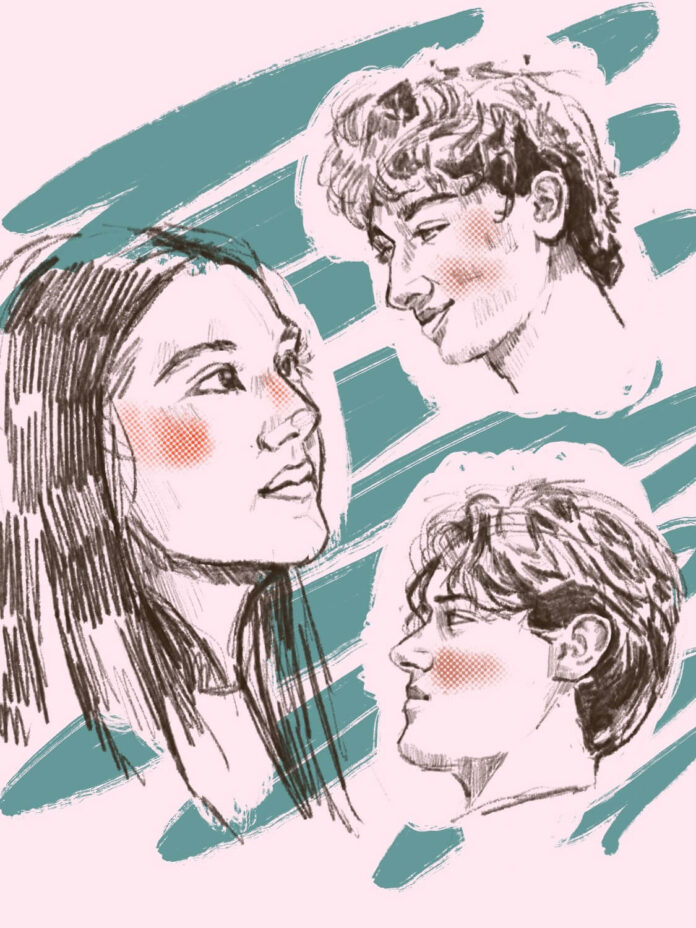In Season 2, Episode 5 of “The Summer I Turned Pretty,” two teenagers almost kiss to Frank Ocean’s “Nikes,” a song that touches on police brutality against the Black community as well as themes of unrequited love. The song connotes a deep sadness that permeates throughout the rest of Ocean’s album “Blonde,” illustrating an unresolved grief. But with the inclusion of “Nikes” in the series, this song about grief is reappropriated as a song about love.
I first watched “The Summer I Turned Pretty” with my sister last fall, and was shocked and amazed at how much the show accomplished in changing the canon of teen romance (a genre I had grown up watching under the tutelage of my older sister). The show, a smash hit from Amazon Prime Studios based on the trilogy of novels of the same name by Jenny Han, subverts the “coming of age” trope into a mature statement on generational grief. The series, its second season released this summer, concerns a love triangle between Belly, the main character, and two brothers: Conrad (the older) and Jeremiah (the younger). Even with certain issues, I see the show — even with its problems — as an important reclamation of love for Gen Z.
Much of the first season is standard high school drama fare: Conrad has quit the football team, and there is a dance at the end of the summer. Throughout the first season, Belly eventually falls for a reciprocating Jeremiah until Conrad discloses his feelings for Belly, which prompts her to leave Jeremiah behind. The season ends with Conrad and Belly together, while it is revealed that Conrad and Jeremiah’s mother, Susannah, has cancer.
Throughout the first season, Belly is not given much character aside from the fact that she is in love with Conrad as her sense of self is attached to his affection and little else. Hence, the summer Belly “turns” pretty — not the summer she felt pretty, or believed she was pretty — is the first summer Conrad sees her as a person he wants to date. As seen in flashbacks, he was actually mean to her in past summers. The series then deflates into another teen show where the protagonist falls for the brooding, nonverbal and emotionally unavailable character. The main trio is practically one-dimensional as the three are only defined in their relation to the other: Belly as she likes Conrad, Conrad as he discreetly likes Belly, and Jeremiah as he likes Belly too. Belly is literally the belly of the world the story inhabits, the omphalos, as the world turns around her. This undoubtedly leaves the viewer wondering, “When will I have my ‘Summer I Turned Pretty’ summer?” which pushes forward a narrative where romantic love is the ultimate goal for all young people.
But the second season quickly takes some genre–breaking turns. Through jarring time skips, it is revealed that Susannah has died, Conrad ended his relationship with Belly (subsequently breaking her heart) and the summer house is in peril of being sold. While clearly internalizing her grief, Belly again falls for Jeremiah, whom she had left for Conrad just a year prior. In a strangely sinister yet beautiful narrative move, the two begin to share a budding romantic relationship as Conrad becomes ever more distant.
In Episode 6, aptly titled “Love Fest,” an intoxicated Belly literally and figuratively chooses Jeremiah over Conrad as she finds herself in between the two at the final party at the summer house soundtracked by Taylor Swift’s “Snow On The Beach.” Belly, her face fully lit in a purple hue, stares at Jeremiah — half his face mired in darkness, illustrating uncertainty — with hope, concern and confusion, until Conrad (his face never in full view) creeps behind her. As Belly moves forward, away from both Jeremiah and Conrad, she narratively leaves behind Conrad — a symbol of her hurt past — and therefore gives the viewers the option to do the same.
By the end of the next episode, Belly confesses her love to Jeremiah, but in as perverse a way as her previous actions — she relates having to give up her dream of being with Conrad in favor of something real: “Dreams aren’t real, and now I want something real.” With a final “I want you” to Jeremiah, it is clear that their relationship exists out of their shared hurt past.
Conrad and Jeremiah exist as a structural pair. While Conrad continues to cage himself off in his sadness, Jeremiah becomes a foil through his kindness and hopefulness — the unlikely choice not just for Belly, but for a cultural history of teen romance. By choosing Jeremiah — the light to Conrad’s pervasive darkness — Belly culturally moves past the option of the emotionally unavailable, distant choice into a new way to love.
In doing so, Jeremiah and Belly’s relationship simultaneously defines and affirms Gen Z love — one that doesn’t revolve around romantic skirmishes, but rather a connection tightly bound by loss. That Gen Z is so intimately connected with grief is self-evident in “Nikes,” the song that soundtracked the teenagehood for many Gen Z-ers. It is no surprise that the couple about to kiss to “Nikes” was Jeremiah and Belly, the two blazing a new trail of what it means to love in contemporary times. Belly describes learning to love out of a hurt past in the same speech to Jeremiah: “You and I… we’re not the same people we were, we grew up,” mirrored by the lyric “We’ll never be those kids again” in Ocean’s song from the same album, “Ivy.”
In the finale, Jeremiah and Belly finally embrace after Conrad leaves, but neither look at each other. Rather, their love suggests and points to the future — a timid, uncertain love, love out of grief.
Contact Sebastian Lechner at slechner@oxy.edu
![]()































